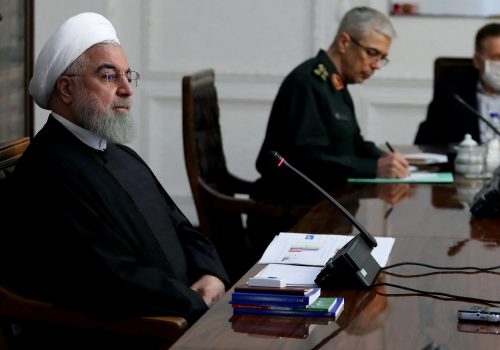US-EU tensions set to escalate over Iran’s coronavirus crisis
The Trump administration’s Iran policy has fueled friction in US-Europe relations. On top of strong disagreements with President Donald Trump’s decision to pull Washington out of the 2015 nuclear deal and re-impose stifling sanctions on the Islamic Republic in May 2018, America’s longstanding partners in Europe also oppose the Trump administration ramping up “maximum pressure” on Tehran amid the global coronavirus pandemic.
Perhaps the COVID-19 global health crisis will prompt European governments to become more defiant of the United States when it comes to their economic relations with Iran. There are two main reasons for why. First, the escalating US-Iran showdown raises the likelihood of a major military confrontation in the Middle East that could seriously jeopardize European security through: a greater influx of Middle Eastern refugees, the likely exacerbation of conflicts in Syria, Lebanon, and Gaza, and the risk of terrorism on European soil from Iran-linked organizations such as Lebanese Hezbollah—blamed for a 2012 bombing in Bulgaria. Second, the coronavirus, once unchecked, could spread beyond the borders of Iran, the worst-hit nation in the Middle East, and compound the already critical situation in Europe.
If the Europeans do stand up against Washington, Iran will have, at least, gained something positive from its predicament. By the same token, if the Instrument in Support of Trade Exchanges (INSTEX)—a French-registered trade mechanism launched in January 2019 to facilitate transactions by circumventing banks—fails to do much to give Iranians relief while coronavirus continues ravaging their country, that will further reinforce Tehran’s view of Europe as subservient to Washington’s global agendas. Consequently, this will push Iranian decision-makers to deepen ties with Russia and China.
No Western government wants to see the Islamic Republic become a nuclear-armed state or even come close to having the capacity to quickly become one. While worries about the unraveling of the JCPOA and Tehran’s ongoing retaliatory intensification of its nuclear activities persist, European powers seem to be less concerned about a nuclear Iran per se than what would happen if the United States, Washington’s Arab allies, and/or Israel went to war to prevent that outcome. Europe’s more pressing concerns stem from the dangers of trying to pressure the Islamic Republic into reversing its nuclear and missile advances and regional intervention through military intimidation and economic strangulation.
A US or Israeli-led war would be unlikely to involve Europe directly, but any conflict could still have a significant effect on the continent’s security and economy.
Perhaps the first option at Iran’s disposal is the unleashing of a massive wave of migration towards Europe in the event of any conflict. While a war is likely to push many Iranians to flee the country—as they did during the 1979 revolution and subsequent eight-year war with Iraq—the Islamic Republic might also use the threat of making life more difficult for its Afghan refugee population, estimated to number up to three million, as leverage. This could strain the European Union’s humanitarian and welfare infrastructure. The Syrian civil war demonstrated all too clearly that this is Europe’s Achilles heel, with anti-migrant protests in EU nations prompting governments to adopt certain measures; stricter border control policies and the striking of a controversial deal with Turkey in March 2016 to halt the influx of refugees.
The coronavirus outbreak in Iran seems to have heightened these concerns, as Tehran keeps defying external pressure—even if that means resorting to measures that ultimately prove self-harming. This includes a refusal to pass into law and implement anti-money laundering and counter-terrorism financing measures required by the Paris-based Financial Action Task Force (FATF). Notably, the defiance caused the intergovernmental watchdog to designate Iran in late February as a high-risk business partner on a par with North Korea—its only companion on the FATF blacklist.
Yet, in March, three European governments announced their completion of a $548,000 transaction with the Islamic Republic. The sale of German medical equipment did not violate US sanctions. The question is whether European officials seek to expand this mechanism beyond non-sanctioned humanitarian goods. If so, that might further strain Washington’s relationship with its European allies.
Additionally, in an uncommon legal victory for Tehran, an appeals court in Luxembourg struck down a longstanding American demand to transfer $1.6 billion in frozen Iranian assets back to the US, so, it could be distributed among 9/11 victims as compensation for Tehran’s alleged involvement in the 2001 terrorist attacks. While other legal obstacles and complications had precluded the money from being released and accessed by Tehran, the verdict is indicative of growing European aversion to complying with Washington in pursuit of “maximum pressure” against the Islamic Republic.
From the Iranian government’s perspective, these European moves, particularly by Britain, France, Germany (E3), are a positive step forward—though not very impactful in practice. One Iranian diplomat responded to the first INSTEX transaction by saying that it was “too little, too late, but still good. Its success depends on E3’s ability to provide it with the necessary liquidity.”
This first E3-Iran transaction comes against the backdrop of officials in Europe recently vowing to pursue economic relations with Iran in order to give Tehran more incentive to return to its JCPOA commitments, which the Iranians have been gradually and openly moving away from since May 2019 as a consequence of Washington’s unilateral pursuit of “maximum pressure.”
For European powers, there is a major interest in keeping the JCPOA alive—even as a zombie accord—until US presidential elections possibly produce a US administration less hostile to transatlantic cooperation. At the same time, governments and societies worldwide will long remember how various powers conducted themselves amid the global coronavirus crisis. Europeans want to be seen as bringing an element of ‘decency’ and ‘humanitarianism’ to their foreign policies in response to the spread of COVID-19.
Giorgio Cafiero is CEO of Gulf State Analytics. Follow him on Twitter @GiorgioCafiero.
Maysam Behravesh is a PhD candidate in political science at Lund University and a political analyst at Gulf State Analytics. Follow him on Twitter: @MaysamBehravesh.
Image: Iran's Foreign Minister Mohammad Javad Zarif arrives at the EU council in Brussels, Belgium May 15, 2018. (Reuters)


